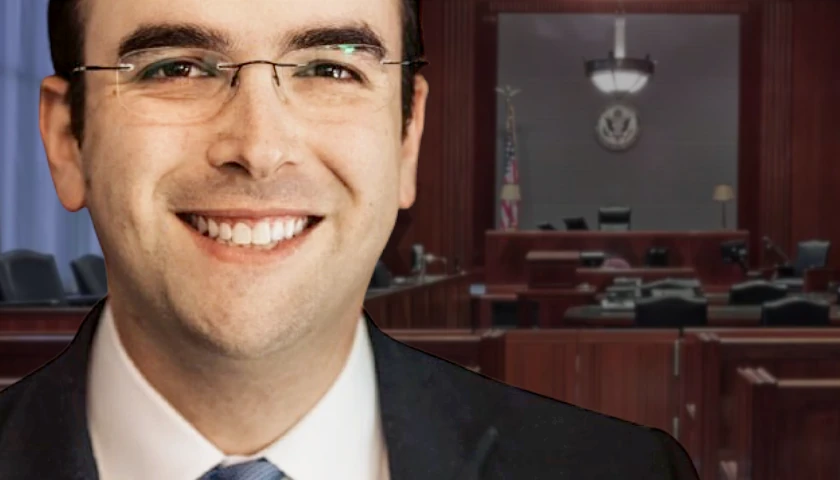Tennessee civil rights lawyer Daniel Horwitz is suing the U.S. Court for the Middle District of Tennessee over a 2022 gag order demanding he cease commenting publicly about a case or be held in contempt of court, arguing a rule cited by the federal court too broadly restricts attorney speech.
Horwitz, in a lawsuit first reported Tuesday by the Free Speech Center at Middle Tennessee University on Tuesday, accuses the federal court system in Middle Tennessee of creating and enforcing an unconstitutionally vague rule that specifically limits the speech of attorneys.
The court imposed a gag order enforcing local rule 83.04 against Horwitz in his lawsuits against CoreCivic, the Tennessee-based private prison company being facing legal action from Horwitz in multiple lawsuits.
CoreCivic is accused through various lawsuits, investigations, and complaints, of mismanaging its prisons, including mistreating prisoners and allowing 22 inmate deaths. Earlier this week, it was reported the company paid $4.4 million to settle inmate complaints in Tennessee.
The Department of Justice (DOJ) similarly began investigating the conditions at CoreCivic’s Trousdale Turner Correctional Center in Tennessee in August, when officials cited “significant justification,” which it stated included “state audits that have flagged dangerous understaffing and safety concerns since Trousdale Turner first opened in 2016.”
In his lawsuit, Horwitz’s attorneys at the Institute for Justice argued the application of local rule 83.04 by U.S. Magistrate Judge Jeffrey Frensley was unconstitutional, as it effectively prevents him from commenting on the case in any forum.
The rule, which is unique to the Middle District of Tennessee, declares any lawyer involved “in the investigation or litigation” of a case is prohibited from making “an extrajudicial statement” about a case if “that the lawyer knows or reasonably should know will be disseminated by public communication, and will have a substantial likelihood of materially prejudicing an adjudicative proceeding in the matter, including especially that will interfere with a fair trial.”
According to the lawsuit, the rule has resulted in an unconstitutional chilling of speech.
The lawsuit argues, “the rule continues to chill his speech about his cases against CoreCivic and subjects him to the risk of sanctions for exercising his First Amendment rights, just as it would chill the speech of any attorney of ordinary firmness.”
Specifically, because the court’s enforcement of the rule “was so broad… non-prejudicial speech can fall under the rule’s prohibition,” which makes it “nearly impossible for Mr. Horwitz to know what public speech about CoreCivic is allowed, and so he restricts all discussion of his cases.”
Horwitz, according to the lawsuit, has resorted to maintaining total silence regarding the case.
“That uncertainty forces Mr. Horwitz to err on the side of silence and chill his otherwise legitimate speech about his litigation in the Middle District,” the attorneys revealed.
The vagueness of rules and gag orders like those used against Horwitz harms his First Amendment rights, the lawsuit argues, “because they cannot be sure whether their speech is subject to the regulation, and, as a result, must self-censor their speech broadly to avoid violating the regulation.”
Horwitz previously represented Michael Patrick Leahy, the editor-in-chief of The Tennessee Star, when he was required to appear at a show-cause hearing by Chancery County Judge I’Ashea L. Myles for the lawsuit filed by Leahy and Star News Digital Media Inc. (SNDM), which owns The Star, to compel Metro Nashville Police Department (MNPD) to release the writings left by Covenant School killer Audrey Elizabeth Hale.
The hearing was called after The Star legally obtained The Covenant Killer’s 2023 Journal from a source familiar with the investigation and began publishing excerpts from the journal. Myles ultimately changed that show-cause hearing to a “landscaping” exercise while keeping Leahy in legal jeopardy.
Myles ultimately ruled not one page of Hale’s manifesto should be released, citing the copyright claims of the Covenant Children’s Trust, which purportedly claims to own the rights to the killer’s intellectual property. Leahy and SNDM have announced their appeal of the decision.
Last month, The Star published The Covenant Killer’s 2023 Journal in its entirety.
– – –
Tom Pappert is the lead reporter for The Tennessee Star, and also reports for The Pennsylvania Daily Star and The Arizona Sun Times. Follow Tom on X/Twitter. Email tips to [email protected].
Photo “Daniel Horowitz” by danielhorowitz.com.






Although they haven`t succeeded, who is the Covenant Children`s Trust and why do they want to block publication of the Manifesto? How is it that they have a legal claim to “copyright”. The Manifesto, thanks to the Tennessee Star is in the Public now.
another lawyer who thinks he has found his claim to fame and wealth. let’s compare the private prison statistics to state and federal. what you want to bet there isn’t much difference.
I hope that Horwitz and the Institute for Justice wins. The court judge has overstepped his authority.